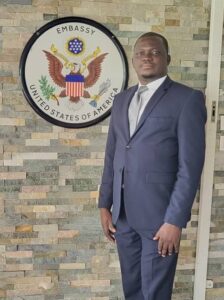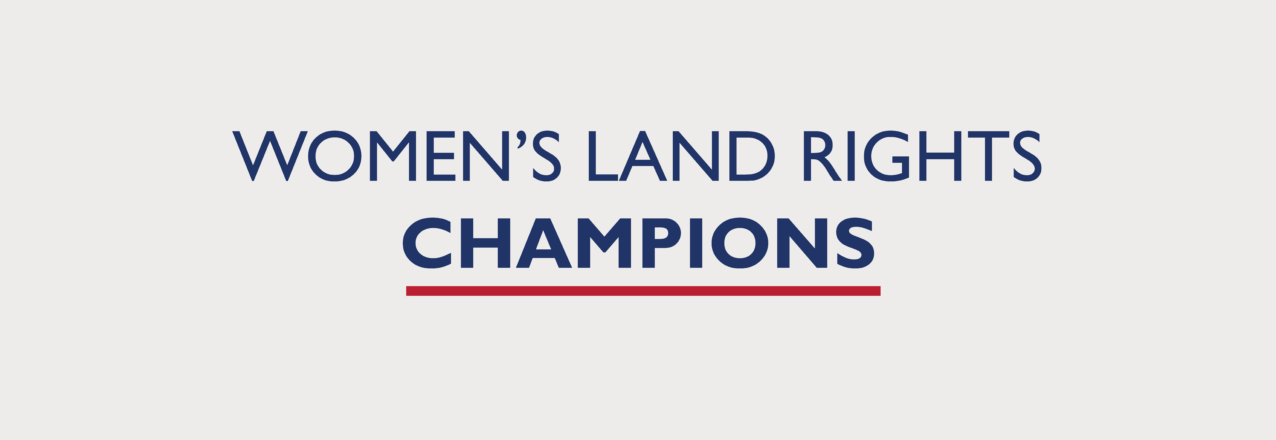This interview with Emile Ako, USAID/Côte d’Ivoire, is part of the REFS/CNE/LRG Women’s Land Rights Champions series, which profiles staff across USAID Missions and operating units who are working to advance women’s land rights.
Tell us about yourself.
 I am a Project Management Specialist in USAID’s Democracy, Rights, Governance and Conflict Prevention office in Abidjan, Côte d’Ivoire. I joined USAID in September 2021; however, my commitment to the Agency goes back nearly 10 years. Previously, I was involved as a consultant and later as an awardee under the USAID Office of Transition Initiatives, where I helped rebuild broken intercommunal relations after the 2011 post-electoral crisis. During this time, USAID produced a short film about my work. Subsequently, I was one of the 12 Young Ivorians selected to participate in former President Obama’s Flagship program, the Mandela Washington Fellowship for Young African Leaders Initiative (MWF-YALI) in 2015. My career in the international development sector started in 2016 when I joined the American NGO Search for Common Ground as a Project Manager in western Côte d’Ivoire. In addition to working in Côte d’Ivoire, I have worked in Ghana, Liberia, and in the Democratic Republic of Congo (DRC).
I am a Project Management Specialist in USAID’s Democracy, Rights, Governance and Conflict Prevention office in Abidjan, Côte d’Ivoire. I joined USAID in September 2021; however, my commitment to the Agency goes back nearly 10 years. Previously, I was involved as a consultant and later as an awardee under the USAID Office of Transition Initiatives, where I helped rebuild broken intercommunal relations after the 2011 post-electoral crisis. During this time, USAID produced a short film about my work. Subsequently, I was one of the 12 Young Ivorians selected to participate in former President Obama’s Flagship program, the Mandela Washington Fellowship for Young African Leaders Initiative (MWF-YALI) in 2015. My career in the international development sector started in 2016 when I joined the American NGO Search for Common Ground as a Project Manager in western Côte d’Ivoire. In addition to working in Côte d’Ivoire, I have worked in Ghana, Liberia, and in the Democratic Republic of Congo (DRC).
In Côte d’Ivoire and in the DRC, local land-related conflicts have exacerbated tensions between communities. My efforts helped to broker peace between communities and resolve land conflicts in both countries. In western Côte d’Ivoire, I led the mediation process that resulted in the reconciliation and land agreement between the previously opposed Baoulé and the Guéré ethnic groups in the town of Kaade. In the DRC, as a Project Manager with Search for Common Ground, I contributed to securing grouped land titles for several thousands of small farmers, including the Twa/Batwa community in the Luberizi Groupement of the South Kivu Province.
Why are women’s land rights and resource governance important to your work? And to other USAID development work?
Equitable and unobstructed access to land for women has a direct impact on poverty reduction, reduces the propensity of violent conflicts, and decreases gender-based violence in the long-run. According to the FAO, while women produce between 60 and 80 percent of subsistence crops in developing countries, they face incredible challenges in gaining access to land and resources, like funds to fertilize their soil or increase their production.¹ The situation is no different in Côte d’Ivoire. The recent 2021 Demographic and Health Survey in Côte d’Ivoire revealed that the percentage of women aged 15 to 49 who reported that they do not possess land has increased from 75 percent in 2011 to 88 percent in 2021.² Moreover, land and resource-related conflicts are frequently identified as a leading cause of conflicts and violence.³ Securing land ownership and access for women is a key contribution that USAID can support to reduce poverty, remove women from abusive and toxic subordination, and make it possible for them to fully participate in the market-based economy. Elevating the status of women also holds a great potential for women’s political participation; as their economic power increases, they become better equipped to challenge regressive social norms and increase their leadership in their communities.
What are some of the biggest challenges in helping women secure land rights and what are some things being done to overcome them?
A political economy analysis conducted as part of the USAID-funded Improving Land Access for Women (ILAW) activity revealed that social norms, traditional practices, and patriarchal beliefs constitute major challenges to women’s access and ownership of land. Other assessments have revealed that, as women are empowered and become economically independent, male patriarchal norms and practices are perceived as threatened, so women are therefore prevented in some traditional societies from having full access and control of land and resources.
In addition to traditional norms, the length and cost of procedures to establish legal land documentation and/or pursue litigation in case of conflict prevent many women from attempting to seek legal or administrative protection for their land. The process of establishing land ownership for rural and urban lands in Côte d’Ivoire has several stages, each with their own costs, long time delays, and specialized procedures. The whole process requires multiple visits to multiple administrations and excessive time and money, so gaining legal land rights can last several months or even years. These challenges can disincentivize rural women, who typically have less income, often lack formal education and have more pressing daily domestic demands. Furthermore, the absence of qualified lawyers in remote areas that can provide legal assistance to these women adds an additional layer of difficulty.
To address some of these challenges, ILAW piloted a multilayered approach that combined awareness, social dialogue, behavior change communication, land mediation and direct legal and organizational support to women and communities. The project initiated educational campaigns to raise awareness about recent positive changes in Ivorian property rights and inheritance laws and behavior change communication campaigns by a local theater group. In addition, the project provided direct livelihood assistance through the introduction of the Gender Action Learning System (GALS),⁴ which allowed about 500 community members to define their collective vision for a more viable and inclusive future for women and girls. The project also provided legal assistance for women to facilitate legal access to land.
What are some of USAID’s successes in the area of women’s land rights?
ILAW is a three-year pilot activity, but even after two years of work, community partners have reported tangible changes at both the individual and collective levels. Below are a few anecdotal successes:
- The village chief from the village of Kapounon on the border with Burkina Faso decided to double the amount of land reserved for women’s agricultural activities following his participation in social dialogue and GALS sessions, despite his initial reluctance.
- Another farmer in northern Côte d’Ivoire reported the following: “Before going to the (GALS) training, I used to work alone, I did not inform my wife and my children of what I earned. But now I bring them together, we talk, and we budget our expenses. It is not a common practice for men and women (husband and wife) to have open communication in our culture. But now I have understood that it’s when we talk to each other, and we get along, that we can give each other new ideas to move forward, and everyone is happy. So, I talk, I discuss, and now they are no longer afraid to come and talk to me.”
- A village chief in western Côte d’Ivoire was quoted saying: “After being village chief for 32 years, I can say that this project has completely transformed my village.” He then described how the training and awareness-raising events led him to divide his land equally between his children, legally marry his wife, and integrate three women into his council of elders.
- The National Rural Land Agency (AFOR), impressed by the GALs tool, initiated dialogue with other international donors to integrate the tool in potential future projects.
- Moreover, AFOR recently partnered with ILAW to pilot a new village land registry. There are also fruitful conversations occurring between the World Bank (WB) and ILAW to share lessons learned for future WB programming in Côte d’Ivoire.
These success stories reveal the transformative power of increasing access to land for women and communities. ILAW has increased communities’ understanding of land regulations, improved the collective bargaining power of rural women, and provided opportunities for women to secure land across target project communities. To date, USAID has reached 6,214 community members in rural western and northern Côte d’Ivoire.
Is there anything else you’d like to share?
Land access for women is an area where USAID can make a sustainable, positive impact in Côte d’Ivoire. However, the success of ILAW remains localized to pilot communities, while land issues are widespread. Consolidating the gains and creating connections with the private sector, linking the women supported under ILAW with microfinance institutions, and facilitating their access to markets in urban areas are a few examples of high impact actions for USAID to pursue in the future.
¹ FAO. 1984. Women in Food Production and Food Security in Africa. Report of the Government Consultation held in Harare, Zimbabwe, 10-13 July 1984, Food and Agriculture Organization of the United Nations, Rome, Italy.
² Jean Chrésus, Côte d’Ivoire: Niellé, un litige foncier au centre de violents affrontements entre les populations fait des morts et des blessés in Koaci.com (retrieved on 10/19/2023).
⁴ https://gender.cgiar.org/tools-methods-manuals/gender-action-learning-system-gals


